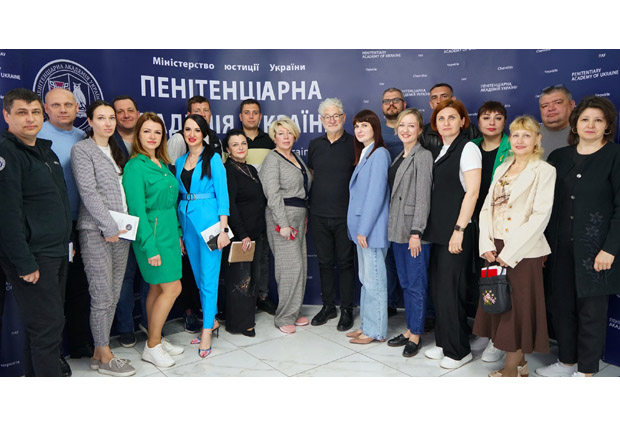Studying the history of the Holocaust tragedy in the Academy of the State Penitentiary Service: Relevance, Opportunities and Challenges
 On 2 May 2024, the Penitentiary Academy of Ukraine in Chernihiv hosted a roundtable discussion "Studying the History of the Holocaust Tragedy in the Academy: Relevance, Opportunities, and Challenges", which was joined by scholars and students of the Academy, Director of the Ukrainian Center for Holocaust Studies, PhD Anatolii Podolskyi; Head of the Jewish Community of Chernihiv Oleksandr Chevan; and representative of the Jewish Museum in Krakow Viktoria Mudrytska.
On 2 May 2024, the Penitentiary Academy of Ukraine in Chernihiv hosted a roundtable discussion "Studying the History of the Holocaust Tragedy in the Academy: Relevance, Opportunities, and Challenges", which was joined by scholars and students of the Academy, Director of the Ukrainian Center for Holocaust Studies, PhD Anatolii Podolskyi; Head of the Jewish Community of Chernihiv Oleksandr Chevan; and representative of the Jewish Museum in Krakow Viktoria Mudrytska.
The Penitentiary Academy of Ukraine is a modern European-style higher education institution that actively engages young people in spreading knowledge about the tragedies of past generations and raising a conscious and tolerant generation that understands the unacceptability of cruelty and discrimination in the modern world.
It is important to note that the Academy is actively involved in international projects that provide an opportunity to tell the world the stories of previous generations of Ukrainian Jews. The results of the project Know. Care. Remember Project, which was carried out at the Academy in 2021-2023 with the support of the Ukrainian Center for Holocaust Studies and TOLI - The Olga Lengyel Institute for Holocaust Studies and Human Rights (New York, USA), was presented by Alla Popruzhna at the event.
During the roundtable, research and teaching staff shared their experience of using Centropa materials in the educational process and students, in their turn, presented the collected video materials of Holocaust testimonies and family stories related to the tragedy. The guests of the roundtable joined in the discussion and exchange of experience.
"Ukrainians now are in the process of learning about themselves: rethinking their culture, studying history and getting to know themselves. And you're doing a great job", – Edward Serotta.
Announcements
MoreLatest News
-
Research and methodological seminar for educators in Lviv
On 15-16 June, we met with more than twenty participants - mostly teachers from Lviv - to discuss the memory of the Holocaust, other cases of genocide on Ukrainian territory, and the current challenges of working with these topics.
[More] -
History of genocides in Ukraine: studying the experience and challenges of the present. Seminar in Kyiv
On 12-13 June, a research and methodological French-Ukrainian seminar History of genocides in Ukraine: studying the experience and challenges of the present was held in Kyiv. It was organised by the Shoah Memorial (Paris) and the Ukrainian Centre for Holocaust Studies (Kyiv) with the support of the Kuras Institute of Political and Ethnic Studies.
[More] -
Educational Materials “Nazi Genocide against Roma in Ukraine, 1941-1944”
The tragic fate of Roma people during WWII still remains largely unknown in Ukraine and generally in Europe. The new educational materials play an important role in returning Roma history and culture into the history and culture of modern Ukraine, unveiling Roma cultural heritage and the tragic events of WWII genocide against them.
[More] -
(No) Children’s Stories Exhibition returned to Chernivtsi
In May-June 2024, Chernivtsi once again invited the interactive exhibition (No) Children’s Stories. This time, it was hosted by Chernivtsi Gymnasium No. 17, and initiated by history and law teacher Varvara Bodnariuk. The students of 7-9 grades volunteered to host the exhibition and during the month of the event, they gave tours to more than 400 people, including students from their school, other schools in the city, and even the mayor of Chernivtsi and a foreign delegation from Dusseldorf (Germany) with the mayor of the city.
[More] -
Learning From The Past - Acting For The Future seminar
On 18-19 May, the seminar Learning from the Past - Acting for the Future was held in Kyiv. It was a joint event of The Olga Lengyel Institute, New York, and the Ukrainian Center for Holocaust Studies, funded by the Olga Lengyel Institute for Holocaust Studies and Human Rights.
[More]




